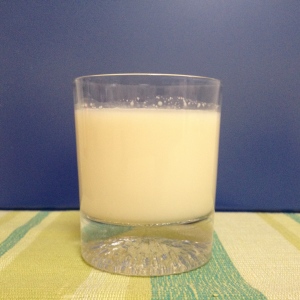Just recently I was reminded about some of the myths about milk. For most people, dairy milk, yoghurt and cheese are a valuable part of a nutritious eating pattern. And there is evidence that humans have been consuming animal milk as a food for at least 8,500 years. In this week’s post I wish to address the main myth that humans cannot digest dairy foods and to recap on the nutritional benefits of dairy.
Can humans digest milk?
The short answer is yes. However there are two clear exceptions to this. Some children are born with an allergy to cows milk protein (casein and whey) and they need to avoid all mammalian milks and products. Of the children born with this allergy, by the age of 2 about 50% will have overcome the allergy, and by 3 to 4 years of age up to 80% children will have overcome it. The other exception is people born with lactose intolerance. Lactose is a naturally occurring sugar in milk and requires an enzyme, lactase, to break it down into two single sugar units — glucose and galactose. People with this intolerance do not have enough lactase to properly digest lactose. People with lactose intolerance can drink lactose-free milk.
Some people experience mild gastric disturbances after drinking milk, but they do not have a protein allergy or lactose intolerance. Milks that are promoted as being more digestible include A2 and goat milk. This is thought to be related to the types of protein and fat in these milks, but is yet to be confirmed by research studies. A2 milk has a different protein mix compared to regular cows milk, as it has less A1 casein and more A2 casein. Goat milk has smaller fat particles than cows’ milk. Some people find A2 or goats’ milk easier to digest.
Myth about the calcium in dairy foods
A common reason for avoiding dairy foods is the belief that humans cannot digest, absorb and metabolise (make use of) the calcium in animal milk and products. A number of different types of research have been undertaken that dispels this myth. These include blood tests that trace the absorption of calcium, providing proof of digestion and absorption. Studies also show that people who drink milk have a lower risk of developing bone disorders such as osteoporosis.
Nutritional benefits of dairy milks
Cows milk and other mammalian milks are a great source of protein and calcium. They are recommended in the Australian Dietary Guidelines. The table below lists the average nutritional content per 100ml of cows, goat and sheep milk, and non-dairy milks. I have included ranges for nutrients with high variance, and averages for the others. It is important to read the nutrition panels on milk products. For example, added sugar, sodium and calcium vary between products.
| Milk | Kilojoules | Protein (g) | Fat (g) | Saturated fat (g) | Sugars (g) | Sodium (mg) | Calcium (mg) |
| Cows | |||||||
| Full fat | 276 | 3.5 | 3.6 | 2.4 | 4.8 | 45 | 127 |
| Low fat | 192 | 3.6 | 1.2 | 0.8 | 5.2 | 53 | 126 |
| Skim | 155 | 3.7 | 0.1 | 0.08 | 5.2 | 46 | 134 |
| Goat | 210 | 3.1 | 2.6 | 1.7 | 3.6 | 66 | 113 |
| Sheep | 454 | 6 | 7 | 4.6 | 5.4 | 44 | 170 |
| Soy | 240 | 2.9 | 3 | 0.45 | 2.5 | 20–120 | 0–160 |
| Rice | 236 | 0.57 | 1.1 | 0.1 | 5.3 | 53–85 | 8–120 |
| Oat | 231 | 1.3 | 1.6 | 0.2 | 2.8 | 0–67 | 0–120 |
| Almond | 125 | 1 | 1.25 | 0.06 | 3 | 40–60 | 0–100 |
| Coconut | 87 | 0.4 | 2 | 2 | 2.5 | 6.2 | 0 |
Nutritional benefits of non-dairy milk
- Calcium fortified soy milk is higher in nutrients compared to other non-dairy milks. If you have a soy allergy or are concerned about the phytoestrogen content then calcium fortified rice, oat and almond milks are excellent alternatives and offer varying benefits.
- Rice milk is the most suitable for people with allergies and intolerances. It is low in fat, but higher in natural sugars. It is also low in protein.
- Oat milk is low in fat, moderate in protein and high in beta glucan. Beta glucan is a soluble fibre that assists in the lowering of cholesterol. Oat milk may not be suitable for people with coeliac disease, as the oats may contain gluten.
- Almond milk is made from almonds and water. It contains healthy fats and a moderate amount of protein.
- Coconut milk offers little protein and no calcium. Rather than see it as substitute for drinking cows milk, add it as a flavour enhancer to curries and sauces.
Enjoy your milk
Dairy milk offers a range of nutritional benefits. However, if you choose not to have dairy milk and products for health or ethical reasons you can select from a number of non-dairy alternatives.
